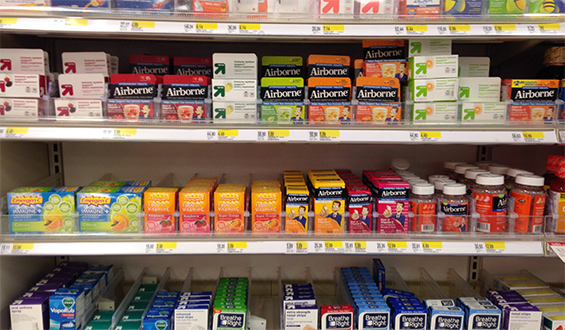 (Image: Wikimedia Commons)
(Image: Wikimedia Commons)
In Canada, roughly one in five children under the age of six is being given cough and cold medicines even though a Health Canada warning has been released alerting parents not to use such products to treat youngsters.
In fact, the federal department has mandated since October 2009 that labels on cough and cold medicines have a warning that parents should not use the medications for kids under the age of six because they are ineffective and potentially dangerous, reports Sheryl Ubelacker for The Canadian Press.
However, a study of parents who give their children over-the-counter drugs before Oct. 2009 and approximately two years after the warning showed that usage dropped by just four percentage points, or from 22% to almost 18%, by Oct. 2011.
“It went down a very little bit, saying to us that even having a label on the bottle is probably not enough to deter its use,” said principal investigator Dr. Jonathon Maguire, a pediatrician and researcher at St. Michael’s Hospital in Toronto. “And I think parents just don’t know that they’re not supposed to be used in little kids.”
Because these products usually contain some mixture of antihistamines, decongestants, cough suppressants, and an analgesic such as acetaminophen, they can cause side effects including high blood pressure and heart palpitations. An added problem is that kids under six may not be able to communicate their reaction to parents.
If a dosage is too large due to overlapping doses or mismeasurement, children could suffer seizures or become comatose. Maguire added that since some of these medications are sedatives, young people could die.
The research was published in the Canadian Journal of Public Health. The scientists followed 1,100 children from one to five who had been seen at one of the seven primary care clinics in the Greater Toronto Area.
If the children had younger parents or were in families with older siblings, they were more likely to be given the OTC remedies even though warning labels are on the containers.
Researchers have suggested that stronger label warnings may deter parents from allowing their children to take the medications. Others propose that the medicine be placed behind pharmacy counters so that druggists can reiterate the importance of the label warnings, writes Alyssa Navarro of Tech Times.
Maguire advised that clinicians could raise awareness of the problem by informing parents that these medications have no real benefit in young children with coughs or colds. He also said he understands, however, that when a child is uncomfortable and cranky, it is second nature for parents to seek some relief.
India’s First Post reports that the country recently eliminated the production and sale of over 300 combination medicines, including two popular cough syrups.
In the US, the CDC has been issuing warnings about the use of these cough and cold medications for children for many years. A Mayo Clinic article says one of the first steps in treating a cold or a cough in children is to encourage the child to drink fluids, especially warm, soothing liquids such as soup or tea.
Kids’ nasal passages can be moistened by using a humidifier or even steam from a hot shower, and parents can soothe a sore throat with frozen fruit pops or cold beverages. And as much as possible, they should make an effort to create a comfortable environment for the young one to rest.




